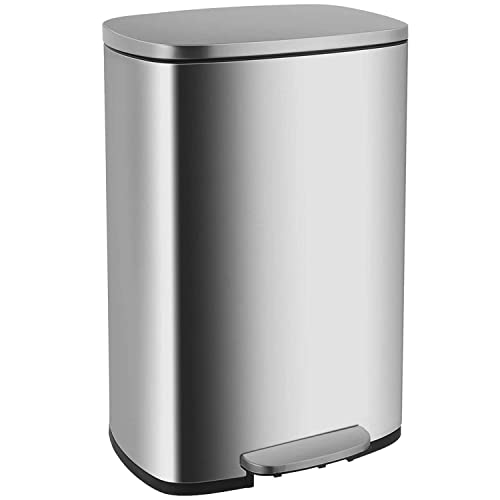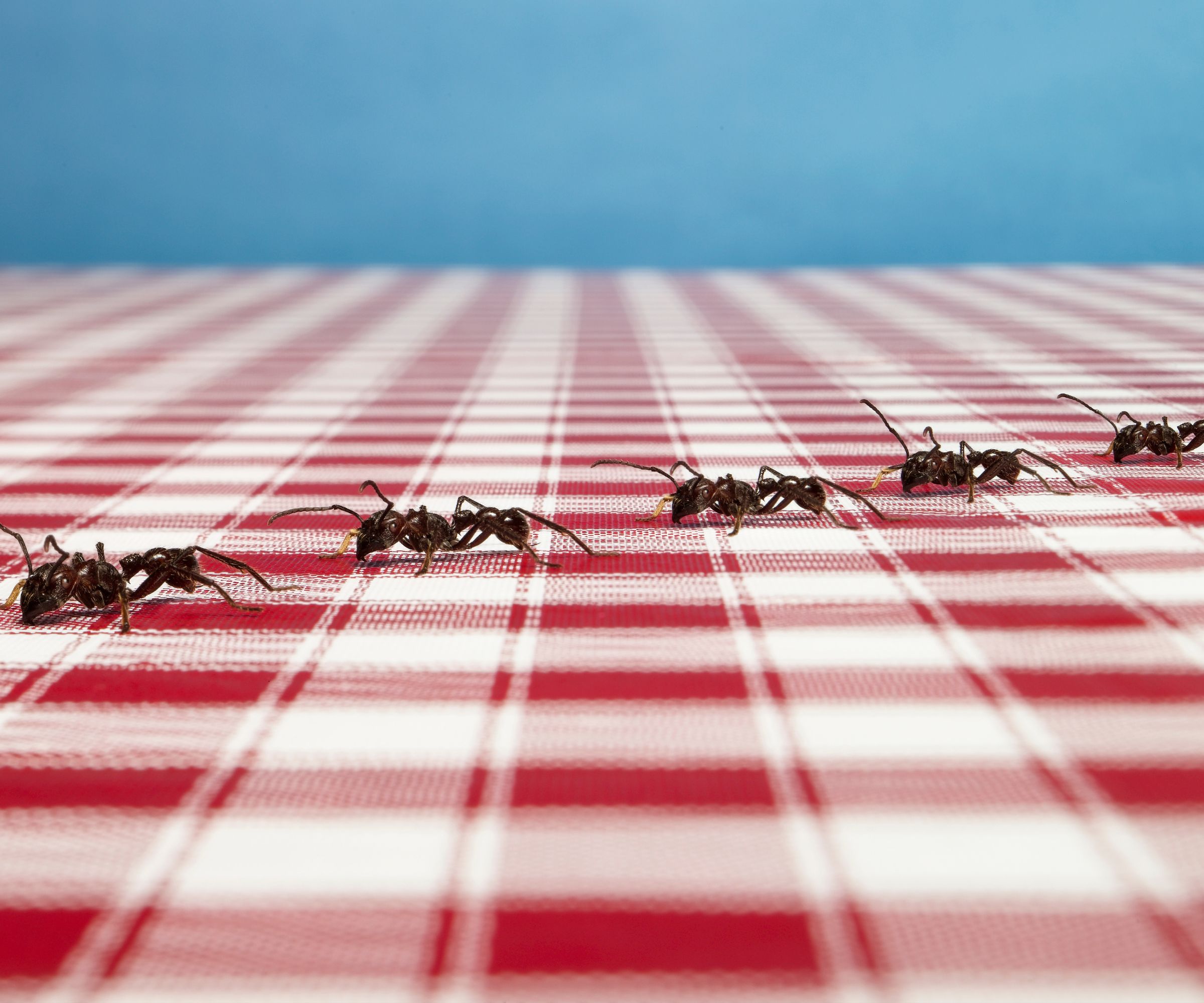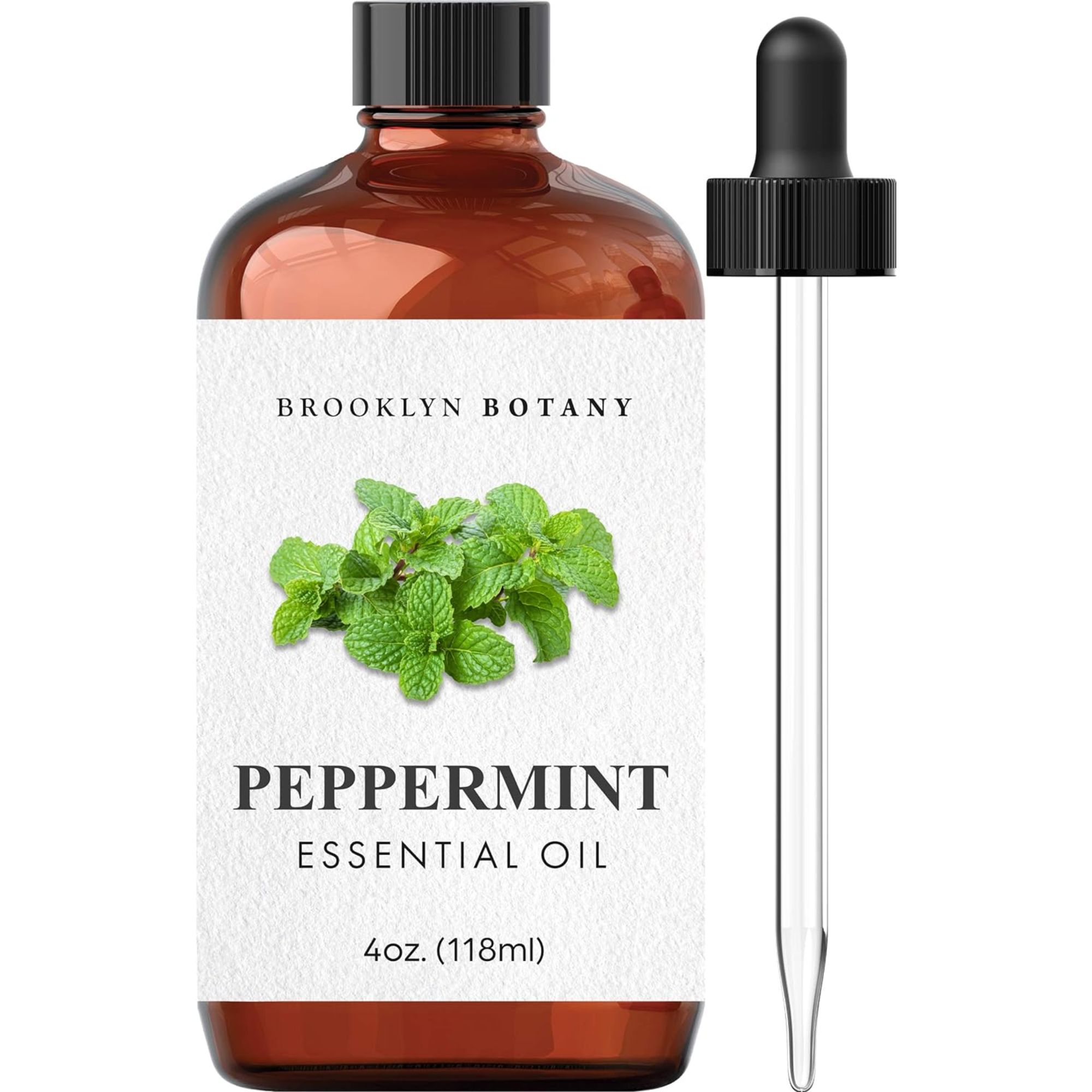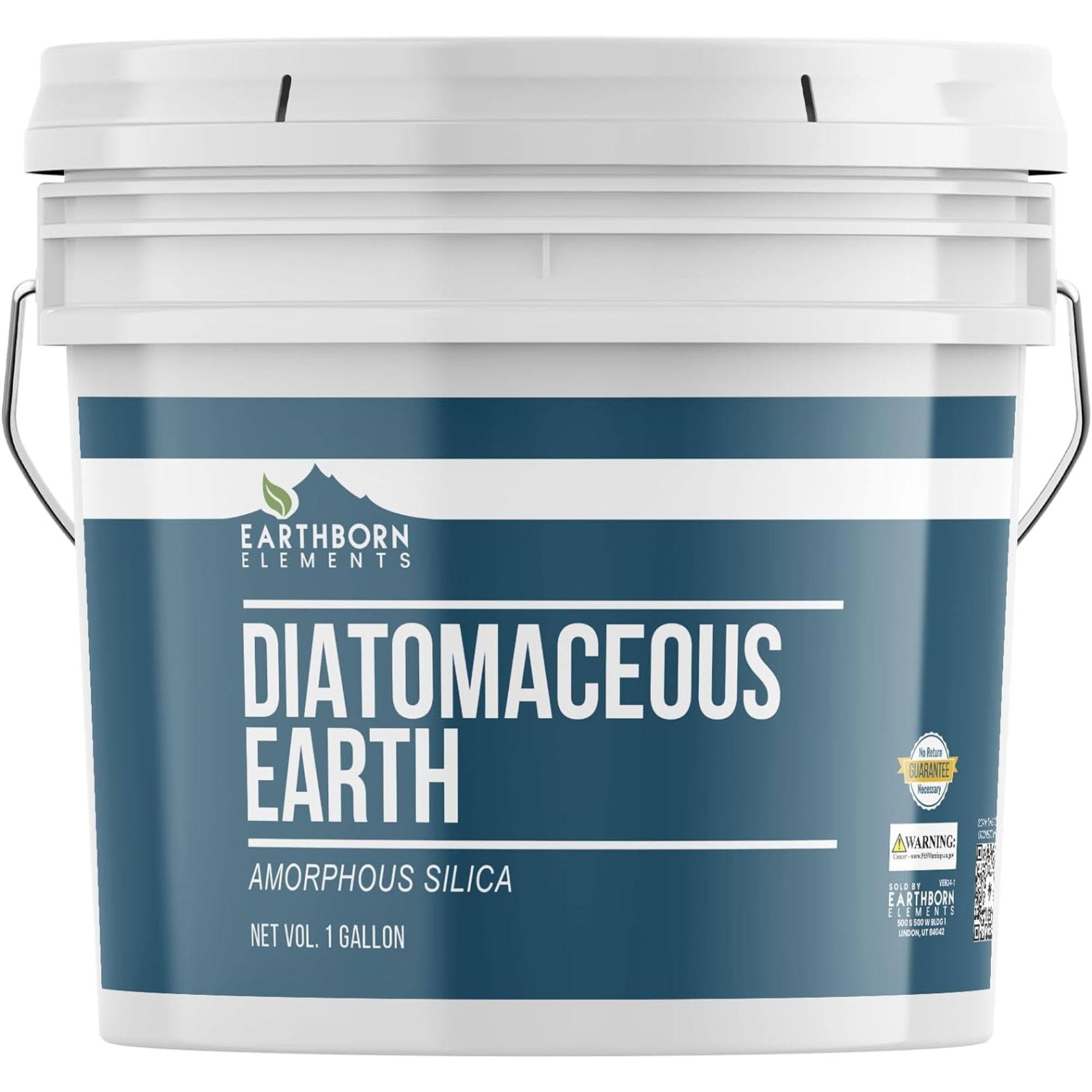How to get rid of ants in your kitchen – and stop them returning for good
Pest control experts share their simple, step-by-step solution to eliminate pesky ants in this vital space

Millie Hurst

- Why do ants come in the kitchen?
- 1. Find the source
- 2. Identify what they're attracted to
- 3. Disrupt scent trails
- 4. Deep clean your kitchen
- 5. Add pesticides
- 6. Seal entry points
- 7. Fix leaks
- 8. Lay down repellants
- What is the fastest way to get rid of ants in the kitchen?
- How do you get rid of ants in the kitchen with baking soda?
Your kitchen is filled with food, ample places for bugs to seek shelter, and water to boot so it's no surprise when given half a chance, ants will make a beeline straight for it. Before you know it, you could be dealing with a full-blown ant invasion in your kitchen.
But, just because ants are making themselves at home doesn't mean you have to put up with them. While you may only spot a couple of ants here and there, it's likely that there are plenty more on their chemical trail, so it's important to deal with the problem quickly and efficiently to stop hundreds more moving in.
If you need to know how to get rid of ants in the kitchen fast a mix of targeted treatments and preventative measures are needed to eliminate, then deter them for good.
How to successfully get rid of the ants in your kitchen
Why do ants come in the kitchen?
Wondering why ants come into the house? Ants are naturally drawn to our kitchens because of the abundance of food and water, and the warmth and shelter provided from outdoor predators.
However, there are dozens of species of ants with different biologies and behaviors, so successfully tackling an infestation, like how to get rid of carpenter ants, requires a strategic approach. The summer months are wonderful for a myriad of reasons, but the hot weather is what draws ants out of the ground and in search of food, which is why you may notice an increase of activity during these warmer months.
Ants also need water for nesting and growing the next generation, whilst wet, hot or humid weather sends them racing indoors.
We spoke to our pest control professionals about how to get rid of ants in the kitchen for good in this step-by-step guide to interrupt the persistent pests routes, address the source of their presence, and find out which deterrents will really work to stop them coming back.
Design expertise in your inbox – from inspiring decorating ideas and beautiful celebrity homes to practical gardening advice and shopping round-ups.
Step 1: Locate and address the source of the problem

Before you begin treating your ant invasion, locate where they are coming in and out of your kitchen from. The most simple way to do so is to follow an ant's trail – they usually travel back and forth on chemical trails to their colony, which should make them easy enough to spot.
If you are struggling, set out some crumbs to attract the ants and monitor them, just be sure to clear them away as soon as possible. You should also step outside and check for leaks, gaps around the windows and doors, and any cracks in your brickwork. Ants can use any and all of these to find their way inside. Use Gorilla Crack and Waterproof Sealant from Amazon to seal the gaps.
Knowing the kind of ant you are dealing with will also help you find the right way to weed them out.
Craig Sansig, pest control expert and service director of Viking Termite and Pest Control says that some ant species, like pavement ants, are quite easy to control, while other ant species, like odorous house ants (also known as sugar ants) and carpenter ants, are far more challenging. Infestations of some species, like pharaoh ants, may even become worse if treated incorrectly. Knowing the species will mean you can use the correct techniques to get rid of them.
Step 2: Identify what the ants are being attracted to

After locating the source of the issue, you should be able to identify what it is specifically in your kitchen that the ants are attracted to, making it easier to remove any appealing aspects of your space.
Brett Bennett, director of operations at PURCOR Pest says, 'Ants are always on the lookout for food sources, so figure out what specifically is attracting them in your kitchen.
'Are they going to your garbage can? If that’s the case, give your garbage can a thorough cleaning, make sure to take your garbage out often, or consider getting a new can with a lid. Are they going into your pantry? Is there a food item that has spilled or something that they are easily able to access? You may want to thoroughly clean your pantry and put your food items in sealable containers so they can’t be accessed by pests.'
This may also be dependent on the type of ant you are dealing with, for example, Georgios Likopoulos, company director at Pest2Control says, 'The black garden ant is one of the most common household invaders, often attracted to sweet food. Moisture or decaying wood attracts carpenter ants, which threaten wooden structures.'
Once you have identified the type of ant and the source of its attraction to your home and kitchen you can begin actively addressing the problem.

Enjoy hands-free operation on this foot-pedal lidded kitchen trash can. Having a lid on your bin will help keep ants out. Regularly use anti-bacterial or a vinegar-water solution to clean down the outside and inside the lid to remove food debris and smells that will attract ants to it.
Step 3: Disrupt their scent trails

The next step to ant-elimination success is to disrupt the ant pheromone trails, as these are what ants use to communicate the location of a food source and navigate to and from their nests, bringing more of their colony into your kitchen. To stop them returning, the trails need wiping out so other ants don't know to navigate into your home.
'I tend to think the most important step for getting rid of ants in a kitchen is effectively destroying their pheromone trails,' says Bennett. 'Otherwise, even if you kill individual ants, there are liable to be more. This can be a bit tricky because common cleaners like bleach or your mop won't effectively erase scent trails–you really need to use white vinegar or an ammonia-based cleaner, which can actually alter the pH of the trail itself to completely eliminate the ability of other ants to follow it.'
White vinegar is a great affordable solution as it's acidic and strongly scented – two things that ants hate. The owner of E.C. House Cleaning, Eliana Coca says, 'Use a natural repellent like a mixture of vinegar and water. Because vinegar is acidic, it disrupts ants' scent trails and deters their movements. Spray this solution directly on the ants and along the paths where they travel.'
White vinegar is available in commercial quantities, such as this 64oz bottle of Great Value Distilled White Vinegar available at Walmart. As per Coca's advice, mix a 50:50 solution of vinegar and water in a suitable spray bottle, such as the Great Value All Purpose Plastic Spray Bottle from Walmart, spray on ants and their trails, and wipe with a damp paper towel. Keep your kitchen well ventilated as the vinegar solution will have a strong scent, necessary for destroying the pheromone trails.
A drop or two of liquid detergent mixed with a spray bottle of water and pure lemon juice's acidic properties can also disrupt the pheromone trails.
However, cleaning, removing, or disrupting the pheromone trail only provides results sufficient to halt the presence of ants temporarily, so once you've done this, it's important to move on to the next stage straight away.
Step 4: Deep clean your kitchen

A tedious yet wholly necessary, vital task: you need to deep clean the kitchen once the ant trails have been disrupted, before they have a chance to return, including behind appliances where food debris can gather unchecked. Remove pet food as soon as meal times are over and do a thorough vacuum and mop of all the floors to remove any sticky residue or grime.
In addition to regularly kitchen cleaning, it's important to periodically pay special attention to the hidden dirty areas of the kitchen we forget to clean, that ants will track down if left unchecked. This includes meticulous cleaning under appliances at least once a week, inside cabinets, and especially around areas where food is stored, ensuring that your kitchen is devoid of food particles and residues at all times.
Shawn Varchetti of D-Bug Pest Control explains that ants are most attracted to a steady source of food. 'They really like sweet or greasy food, so kitchens are a great place for them,' he says. 'They only need tiny amounts of food, such as crumbs that have fallen to the floor or under cabinets, to be drawn into your home,' adds Shawn.
Therefore, some militant vacuuming and wiping down of surfaces is also crucial to stop the ants coming back. Ensure there is no food left in the open, leftovers are stored in airtight containers, and that sticky soda spillages and crumbs are cleaned away quickly. Using one of our best handheld vacuum recommendations will make this easy.
And, while you're cleaning up your food, don't forget about your pets. Ants feed on protein and sugars, making pet food an appealing snack. Consider moving your cat or dog's bowls to the other side of the kitchen and up off the floor at night. This will make it harder for the ants to find them.
Ensure your supply of pet food is stored securely in airtight pet food containers, such as the IRIS USA Airtight Dog Food Storage Container available at Walmart, and that the bowls, and area around them, are kept clean.
When it comes to cleaning, use traditional cleaning sprays, such as the Method Antibacterial All-Purpose Cleaner available at Walmart. This bestselling spray kills 99.9% of germs, while the peppy pink grapefruit scent will further deter ants, due to the citrus scent.
If you prefer to use a more natural remedy, you can clean with lemon juice, by spraying a water and juice solution (one tablespoon of lemon juice to one cup of water), or clean with vinegar, by mixing one part white vinegar to one part water, and either applying with a spray bottle or a microfiber cloth. Lemon is also a natural ant repellent, too.
This can be used on kitchen countertops, cabinet door fronts, and around appliances to disinfect surfaces and stop ants in their tracks, and is a great option if you don't want to use harsh chemicals.
Step 5: Use pesticides

After the deep clean, it's time to take more drastic measures – as you need to ensure that any colonies that were taking up camp in your home are completely eradicated, keeping your kitchen ant-free.
'Ant baits and gels specifically target the breeding queen– the worker ants will take this gel to the queen to consume. If you just target the worker ants then the queen will continue to make more,' says Anna Mollins, a pest control expert from PestFix. Worker ants will return the bait to their colony to feed the larvae. The workers and the queen then eat the byproduct from the larvae, contaminated by the bait.
Avoid using repellents at this stage, or it may stop the ants from picking up the bait and pesticide and taking it back to the colony where it will kill the source of the pest problem.
At the same time, apply a pesticide, whether dust or an ant spray, such as the Raid Ant & Roach Killer from Walmart, in the areas where you have seen ants and along their trails. Focus on cracks and crevices, the edges of the counters, underneath the counter, underneath appliances, and along baseboards. The ants will get the pesticide on their feet and antennas, and when they groom themselves, they then ingest it while carrying the bait back to the colony.
If you want a home remedy, Georgios Liakopoulos from Fantastic Pest Control recommends mixing borax with a sweet substance like honey or sugar. Georgios says, 'You'll make a powerful ant bait that ants will take back to their nests. When consumed, ants pass it along, causing the demise of numerous colony members. Its slow-acting nature takes 48 to 72 hours to eliminate ants.'
You may need multiple bait stations and applications. Don't forget to refresh your bait traps regularly.
Step 6: Block and seal entry points

Remember those entry points you found earlier? After a deep clean and application of pesticides, it's time to block them up – you don't want any remaining ants rediscovering their routes.
'Ants can make their way inside via tiny holes and cracks in and around the kitchen, so be sure to seal all holes and cracks along the foundation and any openings around exterior doors, windows, and utility penetrations,' advises Scot Hodges, an A.C.E. certified entomologist and VP of professional development at Arrow Exterminators.
'However, because ants are so tiny, identifying and eliminating every possible entry point may be very difficult. Ultimately, the best way to keep them away is to practice cleanliness in your kitchen.'
To seal cracks and crevices, you can use caulking, weather stripping, or, to ensure all cracks are entirely closed, expandable foam, such as the Great Stuff Smart Dispenser Pestblock Spray Foam Insulation from Walmart, will do the trick. It's moisture and mildew resistant, and lasts up to 10 years, so you won't need to worry about ants getting through anytime soon.
Step 7: Fix leaky faucets and plumbing

Once you've successfully eliminated one colony of ants, you certainly don't want to attract any more.
'Water can be as strong a draw as food is when conditions outside are dry and ants are in search of water,' says Sansig.
So, by fixing fix leaky faucets and dripping pipes, eliminating standing water, and keeping the kitchen sink clean and dry, you'll make things much less inviting for these pests.
Step 8: Introduce natural repellents into your kitchen

Finally, introducing natural ant repellents in your kitchen should keep them away for good, and smell good, too. Importantly, though, these work in conjunction with keeping on top of kitchen cleanliness, so make sure you don't neglect your cleaning routine.
Our favorite natural repellents are:
- Peppermint essential oil: This is a natural repellent for ants because of its strong scent. Sprinkle on cotton pads and place at entry points, under appliances, and in any other small spaces. You can also add a few drops of the oil to a spray bottle with boiling water and dishwashing liquid. Apply the solution around windows and doors, on ant trails, and in small cracks and holes. You can repel ants with patchouli oil, too.
- Display tansy flowers: These flowers are one of the smells ants hate, plus they can freshen up your kitchen.
- Use cinnamon: Ants loathe the smell of cinnamon, so use powdered cinnamon, its or oil, or sticks of it to deter ants.
- Sprinkle used coffee grounds: Ants hate coffee grounds. Place them on your windowsill to keep ants out. It's best to use coffee grounds outside around entryways.
- Sprinkle diatomaceous earth: 'Natural diatomaceous earth is a powder made from fossilized algae that kills ants and other crawling bugs,' explains Georgios Likopoulos. 'Spread diatomaceous earth along ant trails and entry points to keep them out.' If used to manufacturer's instructions, it's usually safe around pets too. Just be careful you don't inhale it when laying it down. A disposable mask will help during application.
- Create chalk lines: 'Chalk works the same way,' continues Georgios Likopoulos. 'You can use chalk to draw around cracks under doors and near windows. Ants won't get through it. It's even okay to use talcum powder.

This essential oil is pure and undiluted, with a strong potency that ants will hate. The cool, minty aroma with grassy undertones will also freshen up your kitchen, and the oil can be used in a diffuser too. Use 10-20 drops in a spray bottle with water for a pungent solution to spray around your kitchen and it's entry points.

This one gallon bucket is a multi-purpose household essential, as it is non-toxic, and works as an effective food-grade preservative and pest repellent. When you're done, keep the lid shut firmly and out of reach of children and pets. Take care not to inhale the powder when applying it around your home.

While you can use simple chalk sticks to throw off ant trails, using this loose chalk will allow you to easily spread the powder where need be, and vacuum it up after, to avoid discoloring your kitchen items.
FAQs
What is the fastest way to get rid of ants in the kitchen?
'The fastest way to get rid of ants in the kitchen isn't always the best way,' says pest control expert Matt Smith from Green Pest Management. 'You could use a kill-on-contact spray that will kill what it hits and deter them from coming in but it isn't going to do anything for the colony. That is why a lot of people get ants every spring because the source of the problem isn't dealt with.
'One experience that I had was with a couple who thought that they only had a few ants in the spring. They plugged in their toaster and it didn't work. They checked the toaster and pulled out the plug, when they did, ants came pouring out of the electrical outlet. The ants had gotten so bad that they shorted out the outlet.'
Instead, use baits and sprays, and look for products with active ingredient fipronil. The product gets on their arms and legs and they bring it back to the colony and it spreads like a virus from one ant to another. This process will take a few days, but after a week you should have the problem under control.
'Just remember to reapply to kill off anything that might have hatched from the previous application. With the better commercial products our technicians use, it typically only needs application every three months,' Matt explains.

Matt Smith has been working in the pest control industry for 14 years. He started Green Pest Management, Delaware-based pest control company, nine years ago. With his background and experience he is knowledgeable about a variety of pests, pest activity, and ways of dealing with infestations.
How do you get rid of ants in the kitchen with baking soda?
Using baking soda to get rid of ants in the kitchen works when used as a bait trap.
'Baking soda and powdered sugar can work as ant bait. Sugar will attract ants, but baking soda will kill them.' says Liakopoulos.
Simply mix equal parts of powdered or confectioners sugar (this is very important as caster or granulated sugar won't work as the ants will quickly work to separate the two), and baking soda in a cup. You can also add another sweet temptation, such as jam or honey, to really entice the ants. Empty out, clean and replace the cup as needed.
If you've got an ant infestation in your house, chances are they're taking up residence in your garden too, and you'll be wondering how to get rid of ants outdoors without killing plants.
If your ants are only outdoors, take action now before they find their way into your kitchen.

Ottilie joined Homes & Gardens in 2024 as the News Writer on Solved, after finishing a Master's in Magazine Journalism at City, University of London. Now, as the Sleep Editor, she spends her days hunting deals and producing content on all things sleep – from mattresses and sheets to protectors and pillows, all of which she tests in her own home. She also has particular expertise in home fragrance, covering everything from candles to reed diffusers.
Previously, she has written for Livingetc and Motorsport Magazine, and also has a Master's degree in English Literature and History of Art from the University of Edinburgh, where she developed a love for inspiring interiors and architecture.
- Millie HurstContributing Editor